1776 Will Play Broadway Shortly After Inauguration Day 2021
This is the second Broadway revival for the revolutionary American musical.
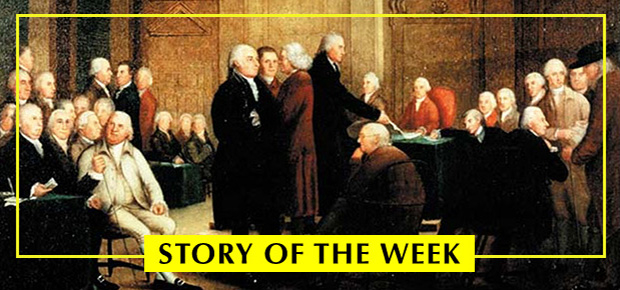
This week it was announced that director Diane Paulus is planning a revival of 1776, the 1969 musical about America’s founding fathers at the Continental Congress. The production will debut at Cambridge’s American Repertory Theater (where Paulus serves as artistic director) in the spring of 2020, before embarking on a series of engagements at theaters across the country. That includes a stop at LA’s Center Theatre Group in July (roughly coinciding with the national conventions of America’s two major political parties). All of this will culminate in a Broadway run with Roundabout Theatre Company in the spring of 2021, just as a new president takes office…or just as the current one settles in for four more years.
Foreign observers have often marveled at the extreme length of America’s presidential campaign, an ever-augmenting series of town halls, debates, rallies, primaries, and caucuses that now begins roughly two years before Inauguration Day. The Paulus revival of 1776 seems ideally scheduled to take advantage of this, so that the words onstage will always echo something that is happening in the national news.
What does 1776 tell us about America in 2020 and 2021? How could Paulus approach the material in a way that will make it feel even more vital? And will theatergoers be eager to hear it, or will they be too sick of politics to care? I look at all of these questions in this Story of the Week.
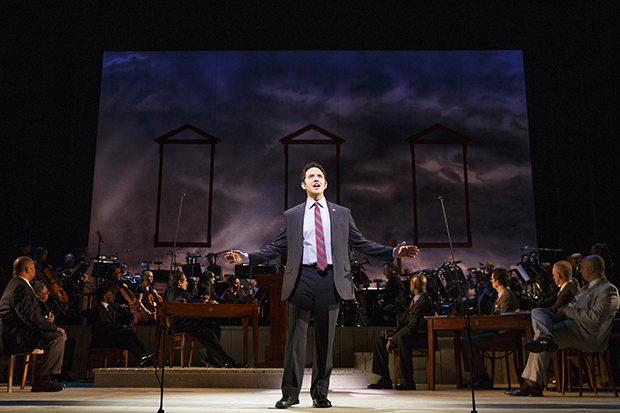
(© Joan Marcus)
What is 1776?
With a score by Sherman Edwards and a book by Peter Stone, 1776 tells the story of how the delegates of the 13 colonies to the Continental Congress became America’s founding fathers by signing the Declaration of Independence. The lead-up to that revolutionary act wasn’t the cool and ceremonious affair depicted in Robert Edge Pine’s painting, but a contentious negotiation marked by personal animosity and painful compromise. While Yankee firebrand John Adams urges the Continental Congress to vote for independence, his fellow delegates tell him to take a seat. His shouting only seems to cause the Pennsylvania patrician John Dickinson to dig in his heels. South Carolina delegate and slaveholder Edward Rutledge wonders what a free nation will mean for his chattel. New York, as always, abstains from the fight “courteously.”
Featuring one of the longest stretches in any book musical of uninterrupted speaking (30 minutes without a song), 1776 imagines what was debated in that sweaty room in Philadelphia. We hear echoes of contemporary political conflicts as these men — and they are all men — rhetorically duke it out.
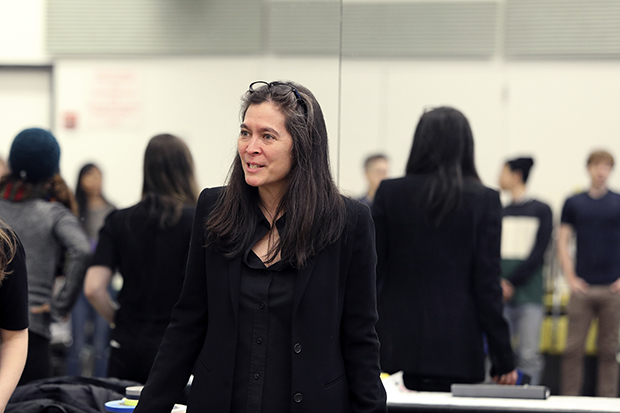
(© Jimmy Ryan)
How will Diane Paulus’s production be different?
Both the original Broadway production (1969) and the last Broadway revival (1997) featured all-white casts in colonial garb, hewing closely to the popular image of how America’s founding fathers would have looked. But in these days of sexy Oklahoma!, we know that there is more than one way to revive a great musical: Broadway audiences still fondly remember Paulus’s 2013 revival of Pippin, which reimagined the Carolingian court as a family circus. This is sure to lead to speculation over how she will envision the Continental Congress.
Nontraditional casting with regard to race is a possibility that was already explored in the 2016 Encores! presentation, though not as robustly as it could have been. That was another presidential year and also the year that Hamilton (a musical that reimagines America’s founders as people of color) took home the Tony for Best Musical. Director Garry Hynes staged 1776 in modern dress, suggesting Congress as it is today, rather than in the 18th century. There was one type of American, however, conspicuously absent from the chamber.
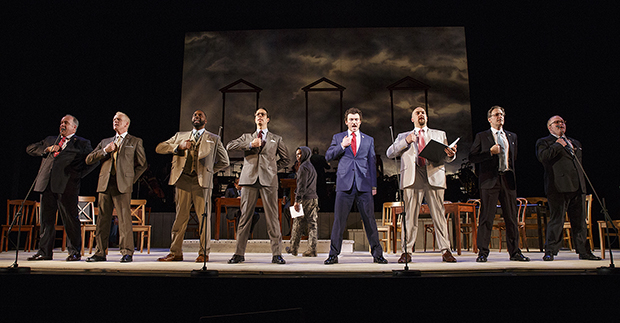
(© Joan Marcus)
1776 features one of the most striking gender imbalances of any major American musical: There are only two female roles (Abigail Adams and Martha Jefferson), a fact that has traditionally led all but all-boys Catholic academies to steer clear of 1776 as a high school musical.
That’s changing: A revolutionary all-female concert staging at Kansas City’s Musical Theater Heritage in 2010 led Keith Edwards (son of the late composer and rights holder) to reconsider the way the show can be cast. In an interview that summer, he noted, “Many smaller towns and theatres find it impossible to cast the show because of the size and makeup of the cast — all men except for two parts. I would like to open up the show, to make it easier to cast, produce and license, and this is a great way to begin doing that.”
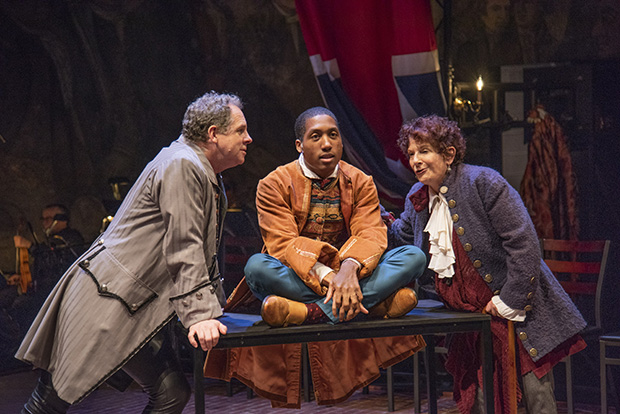
(© Andy Brilliant/Brilliant Photography)
Co-directors Austin Pendleton and Kelli Edwards seem to have taken that statement to heart for their recent mounting of 1776 at New Repertory Theatre in Watertown, Massachusetts: That production featured a black actor playing Thomas Jefferson, and a woman playing Benjamin Franklin.
All of this opens a world of possibilities and further questions for the Paulus production: What would it mean to have a woman portray the shrill John Adams? Could Rutledge, who sings a haunting number about the slave trade, be played by a black actor? As I noted in my review of the Encores! production, Richard Henry Lee’s boast of being a member of the first family of Virginia takes on a new meaning when sung by a black actor (families descended from slaves being some of the oldest lines in our country). There are so many opportunities to illuminate the story, but also a lot of potential pitfalls that could completely distract from it. The underlying material is absolutely strong enough for this kind of revival, so I’m looking forward to seeing what Paulus will bring to it.
Will audiences care?
I think they will! As Heidi Schreck proves nightly in What the Constitution Means to Me, the American Revolution, with all of this flaws and contradictions, is still an ongoing experiment about which people become intensely passionate. That is unlikely to change, no matter the occupant of the Oval Office come spring 2021.
But a production that looks more like America today (and the emerging field of presidential candidates in next year’s election) is even likelier to provoke its audience to draw connections to our contemporary republic and the way it operates — and that is crucial to any successful production. 1776 is a fascinating look at the lost art of compromise that asks its audience a difficult question: What can you live with, and what can you absolutely not tolerate? It’s a question that American voters will also have to answer as they enter the voting booth in November 2020.







